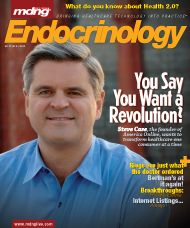Tech Talk: The Revolution That Wasn't
I thought I would use my column this month to discuss RevolutionHealth.com. After spending some time surfi ng around the site, I've concluded that it just might be the most over-hyped health information website ever launched. It's an all-around healthcare information portal, with a few interesting features, but there's nothing revolutionary at all.
I thought I would use my column this month to discuss RevolutionHealth.com. After spending some time surfi ng around the site, I’ve concluded that it just might be the most over-hyped health information website ever launched. It’s an all-around healthcare information portal, with a few interesting features, but there’s nothing revolutionary at all.
Large health information portals for consumers have been around for quite some time, going back to the launch of Drkoop.com and WebMD.com in the 1990s. Th ese websites were also media darlings at a time when interest and investment in the Internet was exploding. Like RevolutionHealth. com, these companies were also founded by larger-than-life personalities who lent credibility and gravitas to the endeavors. Drkoop.com, founded by former Surgeon General C. Everett Koop, netted $88.5 million from its July 1999 IPO. Th e stock subsequently rose from $9 to as high as $45.75 per share, giving this not-yet-profi table company a market capitalization of nearly half a billion dollars! We all know what happened since 2000. Th e stock went to zero, and today Drkoop.com is just another health information website that makes money from advertising. WebMD.com, on the other hand, suff ered a less ignoble fate. Technology industry luminary James Clark, who also founded Netscape, started a company called Healtheon, which merged with WebMD.com in 1999, just as the dot.com bubble was about to burst. Th e idea was that WebMD would be the front end and Healtheon the back end of an integrated company. Clark’s original dream of creating an overarching Web-based system to make healthcare transactions more effi cient is long gone. Instead, WebMD has evolved into a company with related product lines and some successful, albeit not interconnected, Internet portals. In many ways, RevolutionHealth.com and WebMD.com are remarkably similar. Both off er a wealth of healthcare information and make it easy to fi nd a specific topic. I have no problem recommending them to patients who ask for a good health information website. Both sites also allow them to find a doctor or hospital, as well as look up drugs and medications.
RevolutionHealth.com goes a step further by allowing patients to search for an insurance provider. But this is not at all revolutionary, as there are many websites that already allow patients to easily research, compare, and purchase health insurance plans. RevolutionHealth.com also touts that its users can create a PHR. Many healthcare portals off er this feature, including WebMD.com. I railed about the issue of PHRs in my last column, but I think it’s worth reiterating the point. It’s all well and good for patients to enter their own information into a PHR for their own records. But these websites encourage consumers to ask their doctors to review the PHR data as well as provide actual medical records, which the patient can fax to the website company for data entry into their online health record.
Who is going to pay for the time and eff ort that my office must spend to fulfi ll the patient’s request, not to mention the legal risk involved with “reviewing” the patient’s PHR? Once I have agreed to look at my patent’s PHR, I am sure a plaintiff attorney would argue that I should be responsible for knowing and addressing all the data within the PHR. And it won’t be long before a well-intentioned physician gets sued for not adequately addressing some issue alluded to in the PHR. Of course, third-party payers aren’t currently reimbursing us to review the PHR, and when they do, I’m certain receiving the payment will be mired in the painful claims submission and denial process with which we are all too familiar. In the end, RevolutionHealth.com is no revolution. It is simply another healthcare portal that is long on hype but short on solutions to the most critical challenges facing doctor—patient communication. An Internet portal that facilitates data fl ows between doctor and patient, while providing physicians real revenue for this exchange, all while not having to fear malpractice attorneys or deal with thirdparty payers—now that would be a real revolution.
Dr. Bertman is Physician Editor-in-Chief of MDNG: Primary Care/ Cardiology Edition. He is a Clinical Assistant Professor of Family Medicine at Brown University and president of AmazingCharts.com, a leading developer of EHR software. He is also the founder and president of AfraidToAsk.com, a consumer website focusing on personal medical topics. He is in private practice in Hope Valley, RI.
